Related Research Articles
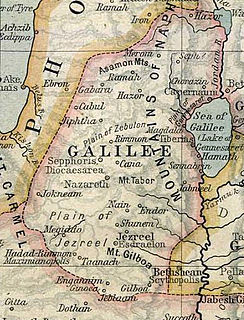
Matthew 4:14–15 are the fourteenth and fifteenth verses of the fourth chapter of the Gospel of Matthew in the New Testament. In the previous verses Jesus returned to Galilee after hearing of the arrest of John the Baptist and then left Nazareth for Capernaum. These introduce and then contain the first portion of a quote from the Book of Isaiah showing how these movements were preordained by scripture.

Matthew 5:26 is the twenty-sixth verse of the fifth chapter of the Gospel of Matthew in the New Testament and is part of the Sermon on the Mount. Jesus has just warned that if you do not reconcile with your enemies a judge is likely to throw you in jail. In this verse Jesus mentions that your debts must be paid completely before one can leave.

Matthew 5:35 and Matthew 5:36 are the thirty-fifth and thirty-sixth verses of the fifth chapter of the Gospel of Matthew in the New Testament. They are part of the Sermon on the Mount. These verses are part of either the third or fourth antithesis, the discussion of oaths. Jesus tells his listeners in Matthew 5:34 "to swear not at all" and in here presents examples of unacceptable swearing.

Matthew 6:27 is the twenty-seventh verse of the sixth chapter of the Gospel of Matthew in the New Testament and is part of the Sermon on the Mount. This verse continues the discussion of worry about material provisions.

Matthew 27:3 is the third verse of the twenty-seventh chapter of the Gospel of Matthew in the New Testament. This verse returns to the story of Judas Iscariot who, in the previous chapter, had accepted payment to betray Jesus to the Jewish authorities. This verse opens the story of his remorse and death.

Matthew 28:1 is the first verse of the twenty-eighth chapter of the Gospel of Matthew in the New Testament. This verse opens the resurrection narrative as Mary Magdalene and "the other Mary" visit Jesus' tomb after the crucifixion.

Matthew 28:3 is the third verse of the twenty-eighth chapter of the Gospel of Matthew in the New Testament. This verse is part of the resurrection narrative and describes the angel who arrived at the tomb of Jesus in the previous verse.
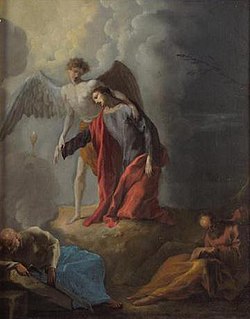
Matthew 28:4 is the fourth verse of the twenty-eighth chapter of the Gospel of Matthew in the New Testament. This verse is part of the resurrection narrative; describing the reaction of the tomb guards after the arrival of the angel of the Lord and the occurrence of an earthquake that opened the tomb.

Matthew 28:2 is the second verse of the twenty-eighth chapter of the Gospel of Matthew in the New Testament. This verse is part of the resurrection narrative. Mary Magdalene and "the other Mary" were approaching Jesus' tomb after the crucifixion, when an earthquake occurred and an angel appeared.

Matthew 28:5–6 are the fifth and sixth verses of the twenty-eighth chapter of the Gospel of Matthew in the New Testament of the Christian Bible. Both verses form part of the resurrection narrative. An angel has appeared at the empty tomb and now gives instructions to Mary Magdalene and "the other Mary".

Matthew 28:7 is the seventh verse of the twenty-eighth chapter of the Gospel of Matthew in the New Testament. This verse is part of the resurrection narrative. An angel has appeared at the empty tomb and in this verse he continues his instructions to Mary Magdalene and "the other Mary".

Matthew 28:9 is the ninth verse of the twenty-eighth chapter of the Gospel of Matthew in the New Testament. This verse is part of the resurrection narrative. Mary Magdalene and "the other Mary" are leaving the empty tomb of Jesus after encountering an angel, and in this verse they encounter the risen Jesus.

Matthew 28:10 is the tenth verse of the twenty-eighth chapter in the Gospel of Matthew in the New Testament. This verse is part of the resurrection narrative. Having left the empty tomb, Mary Magdalene and "the other Mary" are on their way to meet the other disciples, when Jesus meets with them. In this verse the risen Jesus speaks with them.
Matthew 28:11 is the eleventh verse of the twenty-eighth chapter of the Gospel of Matthew in the New Testament. This verse is part of the resurrection narrative. In this verse some of the guards at the tomb return to Jerusalem to report to the chief priests.
Matthew 28:13 is the thirteenth verse of the twenty-eighth chapter of the Gospel of Matthew in the New Testament. This verse is part of the resurrection narrative. In this verse the guards of the tomb, after being present for an angel hearkening the resurrection, were told what to say by the priests of Jerusalem after being bribed.

Matthew 27:11 is the eleventh verse of the twenty-seventh chapter of the Gospel of Matthew in the New Testament. This verse brings the narrative back to Pilate's Court, and the final trial of Jesus.
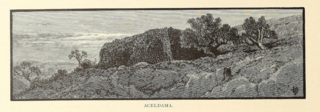
Matthew 27:7 is the seventh verse of the twenty-seventh chapter of the Gospel of Matthew in the New Testament. This verse continues the final story of Judas Iscariot. In the previous verses Judas has killed himself, but not before casting the thirty pieces of silver into the Temple. In this verse the priests decide to buy a potter's field with them.

Matthew 27:5 is the fifth verse of the twenty-seventh chapter of the Gospel of Matthew in the New Testament. This verse continues the final story of Judas Iscariot. In the earlier verse Judas had regretted his decision to betray Jesus, but is met with disinterest from the Jewish leaders. In this verse his response is to return the blood money and then commit suicide.
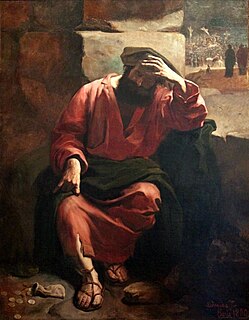
Matthew 27:4 is the fourth verse of the twenty-seventh chapter of the Gospel of Matthew in the New Testament. This verse continues the final story of Judas Iscariot. In the previous verse, Judas had regretted his decision to betray Jesus. In this verse he returns to the Jewish leaders but finds no interest in his change of opinion.
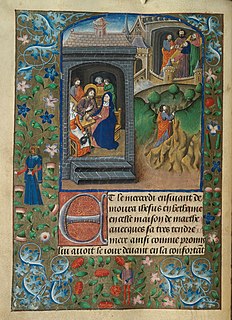
Matthew 27:6 is the sixth verse of the twenty-seventh chapter of the Gospel of Matthew in the New Testament. This verse continues the final story of Judas Iscariot. In the previous verse Judas had cast into the temple the thirty pieces of silver he'd been paid for betraying Jesus. In this verse the priests discuss what to do with them.
References
- ↑ Beare, Francis W., The Gospel According to St. Matthew, Harper & Row, 1981. pg. 543
- ↑ Davies, W. D. and Dale C. Allison, Jr., A Critical and Exegetical Commentary on the Gospel According to Saint Matthew. Edinburgh : T. & T. Clark, 1988-1997.
- 1 2 Gundry, Robert H. Matthew a Commentary on his Literary and Theological Art, Grand Rapids: William B. Eerdmans Publishing Company, 1982. p. 592
- 1 2 Schweizer, Eduard. The Good News According to Matthew. Atlanta: John Knox Press, 1975, p. 526
- ↑ Nolland, John. The Gospel of Matthew: a commentary on the Greek text. Wm. B. Eerdmans Publishing, 2005 pg. 1256
- 1 2 Gundry, Robert H. Matthew a Commentary on his Literary and Theological Art. Grand Rapids: William B. Eerdmans Publishing Company, 1982.
- ↑ France, R.T. The Gospel According to Matthew: an Introduction and Commentary. Leicester: Inter-Varsity, 1985. pg. 410
- ↑ Jones, Alexander. The Gospel According to St. Matthew. London: Geoffrey Chapman, 1965. pg. (page number missing)
| Preceded by Matthew 28:11 | Gospel of Matthew Chapter 28 | Succeeded by Matthew 28:13 |